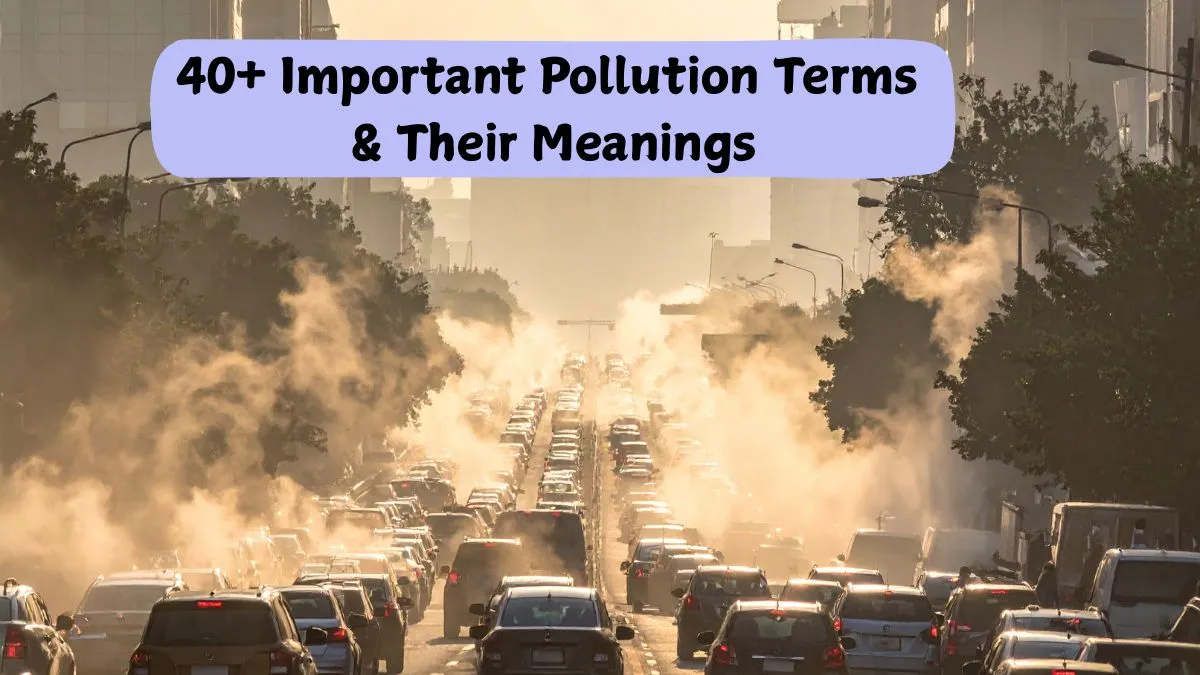- By Aditi Priya Singh
- Wed, 22 Oct 2025 07:28 PM (IST)
- Source:JND
40+ Pollution Terms With Meanings: One of the main problems our planet is currently facing is pollution. Every type of pollution, from soil and noise to air and water, has a different impact on our environment and health. It's crucial to understand the main words and ideas associated with pollution to better comprehend its effects. Although terms like AQI (Air Quality Index), Smog, Greenhouse Gases, and Carbon Footprint are frequently used in news reports and everyday conversations, not everyone is aware of their precise definitions.
We can better understand how pollution spreads, how it is measured, and what we can do to control it by learning these terms. Knowing these words related to pollution can help you make the world cleaner and greener, whether you're a student, an environmentalist, or just a responsible citizen.
Here’s a list of 40+ important pollution terms with their meanings that everyone should know to stay informed and environmentally conscious.
Basic Air Pollution Terms
1. AQI (Air Quality Index): A scale that shows how clean or polluted the air is.
2. Smog: A mix of smoke and fog caused by air pollution.
3. Particulate Matter (PM2.5 / PM10): Tiny particles in the air that can harm lungs.
4. Carbon Monoxide (CO): A colourless, odourless gas from vehicles and factories.
5. Sulphur Dioxide (SO₂): A harmful gas produced by burning coal and oil.
6. Nitrogen Oxides (NOx): Gases that cause smog and acid rain.
7. Ozone (O₃): A gas that protects Earth in the upper layer but causes pollution near the ground.
8. Greenhouse Gases: Gases like CO₂ and methane that trap heat in the atmosphere.
9. Acid Rain: Rain that contains harmful acids formed by pollutants.
10. Carbon Footprint: The total amount of carbon dioxide a person or activity releases.
ALSO READ: 30+ Trending Climate And Environment Slangs Or Terms You Need To Know In 2025
Water Pollution Terms And Their Meanings
11. Eutrophication: Excess nutrients in water cause algae growth and oxygen loss.
12. Oil Spill: Leakage of oil into the ocean, harming marine life.
13. Wastewater: Used water containing chemicals, human waste, or industrial discharge.
14. Biodegradable Waste: Waste that naturally breaks down without harming the environment.
15. Non-Biodegradable Waste: Waste that doesn’t decompose, like plastic and metal.
16. Microplastics: Tiny plastic particles found in oceans and rivers.
17. Sewage: Dirty water and waste from homes or industries.
18. Contamination: Presence of harmful substances in water or food.
19. Marine Pollution: Pollution of seas due to oil spills, plastic, and waste dumping.
20. Waterborne Diseases: Illnesses caused by polluted water, like cholera or typhoid.
Noise and Land Pollution Terms
21. Noise Pollution: Unwanted or harmful sounds from vehicles, machines, or loudspeakers.
22. Decibel (dB): Unit used to measure sound intensity.
23. Solid Waste: Everyday garbage from homes or industries.
24. Landfill: A site where waste is buried underground.
25. Soil Contamination: Pollution of soil by chemicals and waste materials.
26. Littering: Carelessly throwing waste in public places.
27. Hazardous Waste: Waste that is dangerous to health or the environment.
28. Recycling: Reusing waste materials to make new products.
29. Composting: Converting organic waste into fertiliser.
30. Waste Segregation: Separating waste into biodegradable and non-biodegradable types.
ALSO READ: 30+ Important Trading Terms Every New Trader Must Know
Climate Change and Environmental Terms
31. Global Warming: The rise in Earth’s temperature due to greenhouse gases.
32. Climate Change: Long-term shifts in weather patterns and temperatures.
33. Carbon Neutral: Balancing carbon emissions by reducing or offsetting them.
34. Deforestation: Cutting down trees, leading to loss of forest cover.
35. Afforestation: Planting new trees to restore forests.
36. Renewable Energy: Energy from natural sources like the sun, wind, or water.
37. Non-Renewable Energy: Energy from sources like coal and petroleum that can run out.
38. Sustainable Development: Growth that meets needs without harming the environment.
39. Biodiversity: Variety of plants and animals in an ecosystem.
40. Ozone Layer Depletion: Thinning of the ozone layer due to harmful chemicals.
41. Carbon Sink: Natural systems like forests that absorb carbon dioxide.
42. Airborne Pollutants: Harmful substances present in the air that cause pollution.

